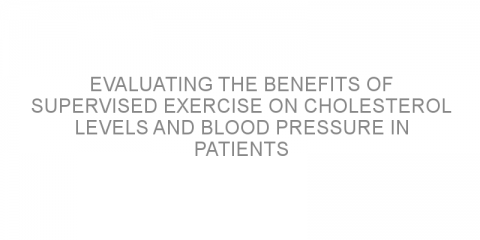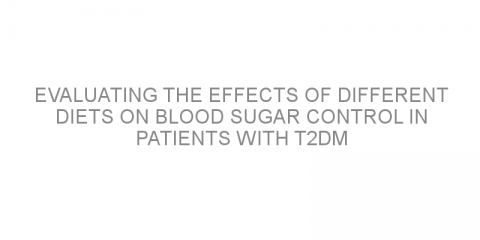In a nutshell This research reviewed several studies which evaluated the effects of supervised exercise on cholesterol and blood pressure in patients with type 2 diabetes mellitus (T2DM). Some background Patients with T2DM have high blood sugar levels either because the body does not respond to insulin (insulin resistance), or because the pancreas...
Read MoreLifestyle Posts on Medivizor
Evaluating the effects of different diets on blood sugar control in patients with T2DM
In a nutshell This review assessed the effects of various diets for achieving blood sugar control, improving cholesterol levels and losing weight in patients with type 2 diabetes mellitus (T2DM). Some background Patients with T2DM have high blood sugar levels mainly due to insulin resistance (the body fails to respond to insulin actions)....
Read MoreThe association between lifestyle and cardiovascular disease in colorectal cancer survivors
In a nutshell The aim of this study was to assess how many colorectal cancer (CRC) survivors had a cardiovascular disease (CVD) and to determine the association between lifestyle factors and CVD. In this study overweight CRC survivors were more likely to suffer from CVD. Some background In the last years the number of CRC survivors has increased...
Read MoreTestosterone as a treatment in men who have had prostate cancer, is it a viable option to improve men’s health?
In a nutshell This article reviews the use of testosterone treatment in men who have had prostate cancer. Although not currently used as a treatment method, there is a small amount of evidence which shows that it does not increase the risk of prostate cancer recurrence or progression. Some background Testosterone is produced largely by the...
Read MoreEvaluating risk factors for future heart disease in adolescents with type 1 diabetes mellitus
In a nutshell This article looks at common heart disease risk factors among adolescents with type 1 diabetes mellitus (T1DM), with special attention paid to the metabolic syndrome. It concludes that adolescents with T1DM have a tendency to have large waistlines and high blood pressure, both of which put them at risk for heart disease later in...
Read MoreHealth behaviors in breast cancer survivors to lower the risk for breast cancer
In a nutshell This article evaluates lifestyle behaviors breast cancer survivors adopt in order to lower the risk of recurrence. Some background In the past years the number of breast cancer survivors has increased as a result of early detection and medical advances regarding cancer therapies. However, breast cancer survivors are at great risk of...
Read MoreEfficacy and adherence to a lifestyle modification program in sedentary breast cancer survivors
In a nutshell This study evaluated the efficacy of home-based lifestyle counseling and coaching program in achieving adequate lifestyle changes in older sedentary breast cancer survivors. Some background Older breast cancer survivors are at risk of developing secondary cancers, heart diseases and declining self-care capacity. Previous...
Read MoreEfficacy and adherence to a lifestyle modification program in sedentary colorectal cancer survivors
In a nutshell This study evaluated the efficacy of home-based lifestyle counseling and coaching program in achieving adequate lifestyle changes in older sedentary colorectal cancer (CRC) survivors. Some background Older CRC survivors are at risk of developing secondary cancers, heart diseases and declining self-care capacity. Previous...
Read MoreSugar-rich foods and colorectal cancer recurrence
In a nutshell This study investigated whether diets rich in carbohydrates influence recurrence rates in patients treated for colorectal cancer. The main finding was that a higher glycemic (sugar) load and carbohydrate intake were associated with a greater risk of cancer recurrence. Some background Dietary factors, as well as body...
Read MoreEfficacy and adherence to a lifestyle modification program in sedentary prostate cancer survivors
In a nutshell This study evaluated the efficacy of a program for home-based, sustainable, lifestyle changes in older sedentary prostate cancer (PCa) survivors. Main findings: participants demonstrated and maintained healthy dietary behaviors, physical activity and functional ability. Some background Older PCa survivors are at risk of developing...
Read MoreTreatment options for localized prostate cancer – comparing long-term adverse effects
In a nutshell This study aimed to identify health-related decline in quality of life 4 to 8 years after prostate cancer (PC) treatment. Main finding: measures of quality of life vary based on therapy choice. Some background Treatments for localized PC (confined to the prostate gland) include radical prostatectomy (RP), brachytherapy (BT) and...
Read MoreThe effects of a drastic change in lifestyle on the reversibility of Type 2 Diabetes
In a nutshell The present study examined the effects of a long-term intensive weight-loss intervention (ILI) on type 2 diabetes mellitus (T2DM). ILI was associated with a greater probability of partial remission (fasting blood sugar <126 mg/dl) of diabetes, and a low prevalence of absolute remission (normal blood sugar levels). Some...
Read More












